When it comes to achieving healthy and glowing skin, the saying "you are what you eat" holds true. However, have you ever considered the specific impact your diet has on your skin health beyond just the surface level? Understanding how the foods you consume can either nourish or harm your skin is essential for maintaining a clear and radiant complexion. By exploring the intricate relationship between diet and skin health, you may uncover surprising insights that could revolutionize your skincare routine.
Key Takeaways
- Essential nutrients like vitamins and minerals support skin health and repair.
- Antioxidants protect skin from damage caused by free radicals.
- Hydration is vital for healthy skin, both internally and externally.
- Omega-3 fatty acids maintain skin hydration and elasticity.
Importance of Nutrient-Rich Foods
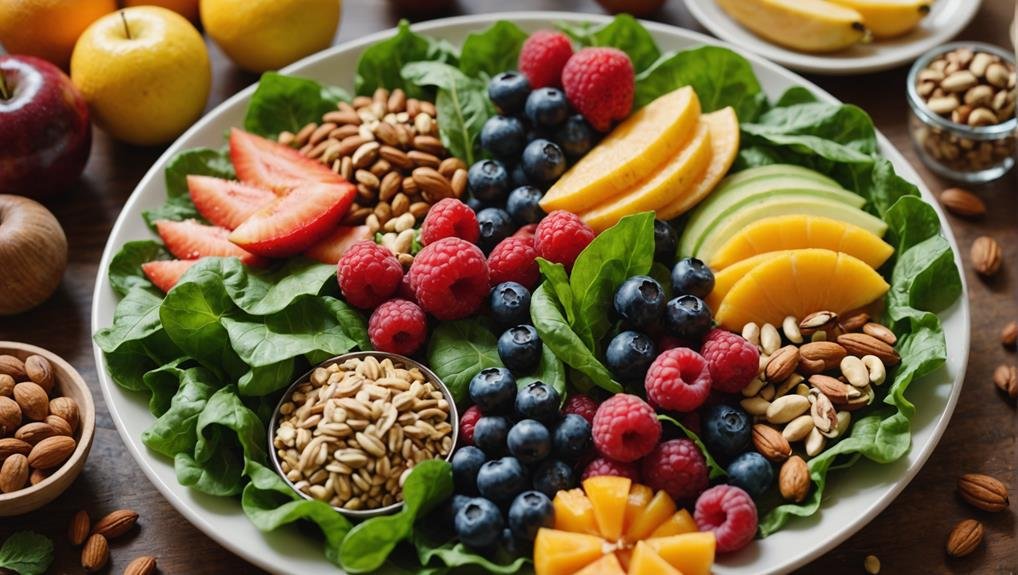
Consuming a diet rich in essential nutrients such as vitamins, minerals, and antioxidants plays a crucial role in maintaining optimal skin health. Superfoods for skin, like blueberries, spinach, and nuts, are packed with vitamins A, C, and E, which are potent antioxidants that help protect the skin from damage caused by free radicals. These superfoods also contain minerals like zinc and selenium, which are essential for collagen production and skin repair.
Nutrient absorption is key when it comes to reaping the benefits of these superfoods. Vitamin C, for example, enhances the absorption of iron, a mineral crucial for skin health. Including foods rich in vitamin C, such as citrus fruits or bell peppers, alongside iron-rich foods like lentils or spinach, can maximize the body's ability to utilize these nutrients effectively.
Incorporating a variety of nutrient-dense foods into your diet ensures that your skin receives the necessary building blocks for repair, rejuvenation, and protection against environmental stressors. By focusing on superfoods and optimizing nutrient absorption, you can promote healthy, glowing skin from the inside out.
Hydration and Skin Health
Maintaining adequate hydration levels is essential for promoting optimal skin health and function. Dehydration can lead to dry, flaky skin and exacerbate skin conditions like eczema.
Here are some tips to keep your skin hydrated and healthy:
- Drink Plenty of Water: Hydrate your skin from the inside out by consuming an adequate amount of water daily.
- Moisturize Regularly: Use a hydrating moisturizer to lock in moisture and prevent water loss from the skin.
- Eat Water-Rich Foods: Incorporate foods with high water content such as cucumbers, watermelon, and oranges into your diet to support skin hydration.
- Limit Dehydrating Beverages: Reduce your intake of dehydrating beverages like alcohol and caffeinated drinks, as they can contribute to skin dryness.
Antioxidants for Skin Protection
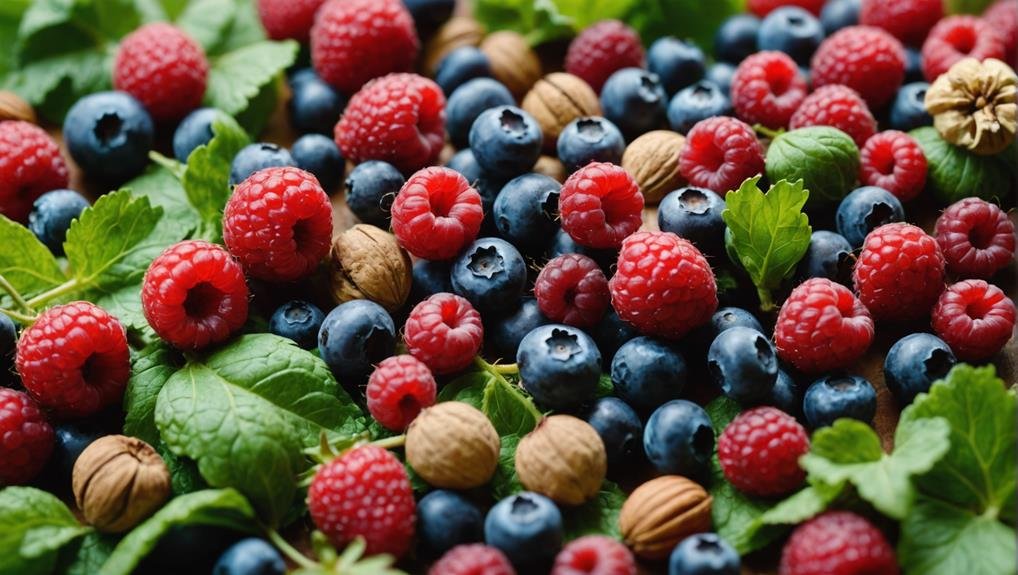
Antioxidants play a crucial role in protecting your skin from damage caused by free radicals and oxidative stress. Green tea antioxidants, for example, have been shown to provide additional protection when used alongside sunscreen. Vitamin C serums are another excellent choice, offering a wide range of antioxidant benefits that can help combat the effects of environmental stressors on your skin. Incorporating these antioxidants into your skincare routine can promote healthier, more resilient skin over time.
| Antioxidant Source | Benefits | Usage |
|---|---|---|
| Green Tea | Enhances sunscreen protection | Drink as a tea or apply topically |
| Vitamin C Serums | Fights free radicals, boosts collagen production | Apply in the morning before sunscreen |
These antioxidants work synergistically to neutralize harmful free radicals and minimize oxidative damage to your skin. By incorporating green tea antioxidants and vitamin C serums into your daily skincare regimen, you can enhance your skin's natural defense mechanisms and maintain a youthful, radiant complexion.
Omega-3 Fatty Acids Benefits
Omega-3 fatty acids, essential nutrients found in certain foods, offer numerous benefits for skin health. These healthy fats play a crucial role in maintaining skin hydration and promoting a youthful appearance through their anti-aging properties.
Here are four ways in which omega-3 fatty acids benefit your skin:
- Improved Skin Hydration: Omega-3 fatty acids help to strengthen the skin's natural oil barrier, reducing moisture loss and keeping your skin hydrated from within.
- Reduced Inflammation: By having anti-inflammatory effects, omega-3 fatty acids can help calm irritated skin conditions like acne, eczema, and psoriasis.
- Enhanced Skin Elasticity: The anti-aging properties of omega-3 fatty acids contribute to maintaining skin elasticity, reducing the appearance of fine lines and wrinkles.
- Protection Against Sun Damage: Research suggests that omega-3 fatty acids may offer some protection against UV-induced skin damage, helping to prevent premature aging caused by sun exposure.
Incorporating omega-3 rich foods into your diet can be a delicious way to support your skin's health and appearance.
Collagen-Boosting Foods
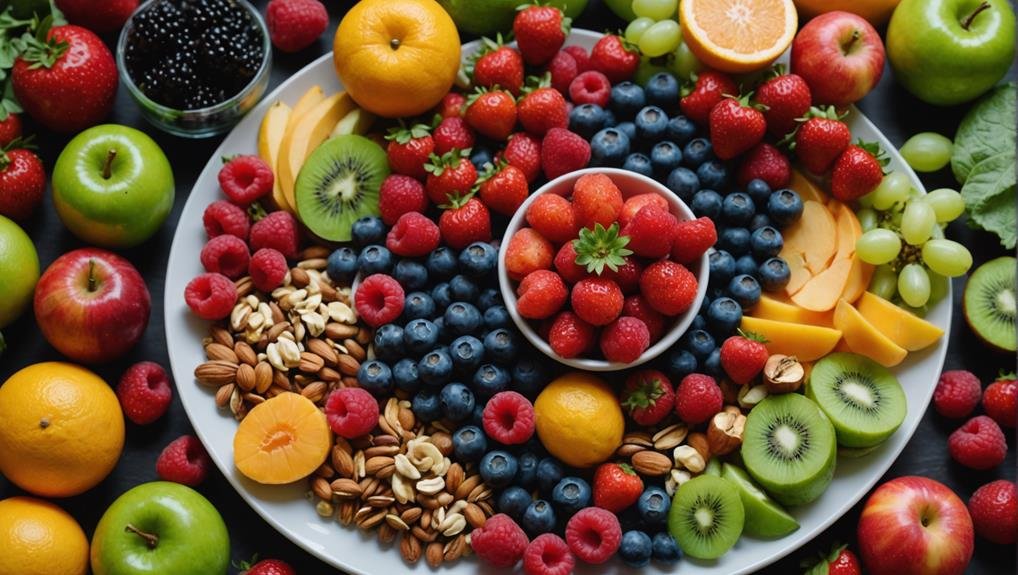
To further enhance your skin health and support collagen production, incorporating collagen-boosting foods into your diet is a beneficial strategy. Collagen, a protein that provides structure to your skin, can be enhanced through dietary choices.
Collagen boosting supplements containing ingredients like vitamin C, zinc, and copper can aid in collagen synthesis. Additionally, skin-friendly smoothies packed with collagen-boosting fruits such as berries, citrus fruits, and tropical fruits can provide a delicious way to nourish your skin from the inside out.
For a more hands-on approach, DIY collagen masks made from natural ingredients like honey, yogurt, and aloe vera can be applied topically to promote collagen production and improve skin elasticity.
Including collagen-boosting recipes in your meal plan, such as bone broth, salmon, nuts, seeds, and leafy greens, can further support your skin's collagen levels. By incorporating these collagen-boosting foods into your diet, you can help maintain healthy and vibrant skin.
Foods That Reduce Inflammation
Incorporating a variety of foods known for their anti-inflammatory properties into your diet can play a significant role in reducing inflammation and promoting overall skin health.
Here are four key items to consider:
- Anti-inflammatory Spices: Turmeric, known for its active compound curcumin, has potent anti-inflammatory effects. It helps in reducing inflammation in the body, which can benefit the skin by calming conditions like acne and eczema.
- Skin-Friendly Herbs: Herbs like ginger and garlic contain anti-inflammatory properties that can help in alleviating skin redness and irritation. They also support overall skin health by combating inflammation from within.
- Plant-Based Antioxidants: Foods rich in antioxidants like berries, leafy greens, and nuts help in reducing inflammation and protecting the skin from oxidative stress. These plant-based antioxidants promote skin repair and rejuvenation.
- Skin-Soothing Teas: Chamomile tea and green tea are known for their anti-inflammatory and antioxidant properties. They can help in calming skin issues like redness and swelling while providing a boost of skin-friendly nutrients.
Sugar and Skin Aging
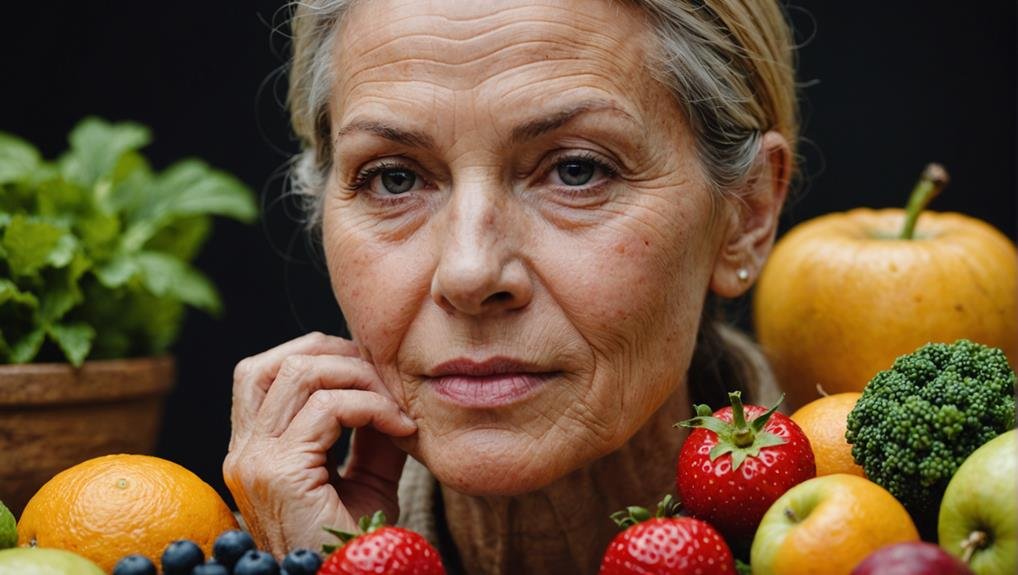
The consumption of high amounts of sugar has been linked to accelerated skin aging through a process known as glycation. When sugar molecules bind to proteins in the skin, they form advanced glycation end products (AGEs). These AGEs can damage collagen and elastin, essential proteins that maintain skin elasticity and firmness.
As sugar consumption increases, so does the production of AGEs, leading to a breakdown of collagen and elastin fibers in the skin. This, in turn, contributes to the development of wrinkles, sagging skin, and a loss of youthful appearance.
To maintain skin health and prevent premature aging, it's advisable to moderate your sugar intake. Opt for natural sweeteners like honey or fruits instead of refined sugars. Additionally, consuming a diet rich in antioxidants from fruits, vegetables, and whole grains can help counteract the effects of glycation and support skin elasticity.
Vitamins Essential for Skin
Consuming a diet rich in key vitamins is essential for maintaining optimal skin health and function. These skin-nourishing vitamins play crucial roles in supporting skin repair, growth, and overall radiance.
Here are four essential vitamins for healthy skin and their common sources:
- Vitamin A: Essential for skin cell growth and repair, Vitamin A helps maintain smooth and glowing skin. Sources include sweet potatoes, carrots, and spinach.
- Vitamin C: Known for its antioxidant properties, Vitamin C aids in collagen synthesis and protects the skin from damage caused by free radicals. Citrus fruits, bell peppers, and strawberries are excellent sources.
- Vitamin E: This vitamin helps protect the skin from UV damage and supports skin hydration. Nuts, seeds, and avocados are rich sources of Vitamin E.
- Vitamin D: Crucial for skin cell growth, repair, and metabolism, Vitamin D can be obtained from sunlight exposure, fatty fish, and fortified dairy products.
Minerals for Healthy Skin
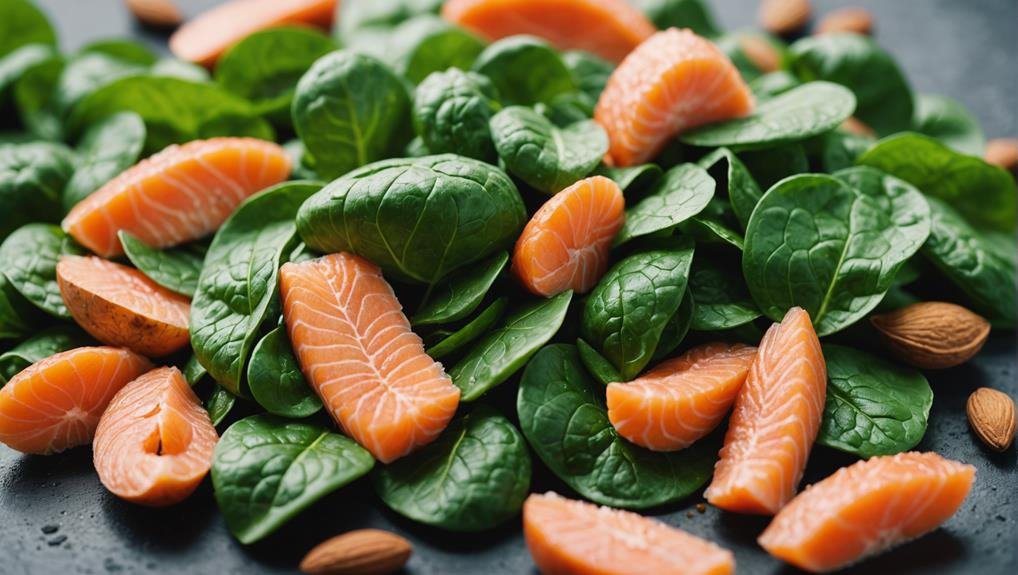
To maintain healthy skin, ensuring an adequate intake of essential minerals is paramount for supporting various skin functions and promoting overall skin health. Minerals play a crucial role in the structure and function of skin cells, aiding in processes such as collagen production, hydration, and protection against environmental stressors. Incorporating minerals into your diet can enhance the efficacy of skincare routines and complement natural remedies for skin issues.
| Minerals | Role in Skin Health |
|---|---|
| Zinc | Supports wound healing and helps regulate oil production |
| Selenium | Acts as an antioxidant, protecting skin from UV damage |
| Magnesium | Enhances skin barrier function and reduces inflammation |
| Copper | Plays a role in collagen synthesis and skin elasticity |
Including mineral-rich foods like nuts, seeds, whole grains, and leafy greens in your diet can provide these essential nutrients for healthy skin. By prioritizing minerals alongside vitamins in your diet, you can optimize your skincare routine and boost the effectiveness of natural remedies for common skin concerns.
Probiotics and Gut-Skin Connection
Enhancing skin health through the consumption of probiotics is supported by the intricate relationship between gut health and skin conditions. Probiotics, often referred to as 'good bacteria,' play a crucial role in maintaining a healthy gut microbiome, which in turn can positively influence the skin microbiome.
Here are four key points to consider when exploring the connection between probiotics and skin health:
- Probiotic Benefits: Consuming probiotics can help balance the gut microbiota, leading to potential improvements in skin conditions such as acne, eczema, and rosacea.
- Skin Microbiome: The skin microbiome is the diverse community of microorganisms living on the skin's surface. Probiotics can enhance the diversity and balance of this microbiome, promoting healthier skin.
- Inflammation Reduction: Probiotics have anti-inflammatory properties that can help reduce skin inflammation, redness, and irritation, contributing to a clearer complexion.
- Barrier Function: By supporting the gut lining, probiotics can improve intestinal barrier function. A healthier gut barrier may prevent harmful substances from leaking into the bloodstream and triggering skin issues.
Foods to Avoid for Clear Skin

Avoiding certain foods can play a crucial role in maintaining clear and healthy skin. Skincare myths and dietary misconceptions often lead to confusion about which foods are beneficial or harmful to skin health.
Certain lifestyle habits can also trigger adverse skin reactions, making it essential to be mindful of what you consume. Foods high in processed sugars and refined carbohydrates, such as sugary snacks and white bread, can contribute to inflammation and acne breakouts. Dairy products, particularly milk, have been linked to skin issues in some individuals due to hormonal components.
Greasy and fried foods may exacerbate acne by increasing sebum production. Additionally, some people may experience skin reactions to high iodine foods like seaweed and shellfish. By avoiding these common culprits and paying attention to how your skin responds to different foods, you can take proactive steps towards achieving clearer and healthier skin.
Creating a Skin-Healthy Meal Plan
Craft a balanced and nutrient-dense meal plan to support optimal skin health and function. To create a meal plan that promotes healthy skin, consider the following tips:
1. Meal Prep:
Dedicate time each week to meal prep. Having ready-to-eat nutritious meals can prevent you from reaching out for convenient but unhealthy options that may negatively impact your skin.
2. Grocery Shopping:
Make a list before heading to the store to ensure you purchase skin-friendly foods like fruits, vegetables, whole grains, lean proteins, and healthy fats. These foods provide essential vitamins and minerals that support skin health.
3. Portion Control:
Pay attention to portion sizes to avoid overeating, which can lead to weight gain and skin issues. Opt for smaller plates to help control portion sizes effectively.
4. Meal Timing:
Aim for regular meal times spaced throughout the day. Consistent meal timing helps regulate blood sugar levels, which can impact skin health by reducing inflammation and preventing breakouts.
Frequently Asked Questions
Can Certain Foods Worsen Skin Conditions Like Acne and Eczema?
Certain foods like dairy products can worsen skin conditions such as acne and eczema by triggering inflammation. Additionally, high sugar intake has been linked to increased breakouts. Being mindful of these connections may help improve your skin health.
How Quickly Can Changes in Diet Improve Skin Health?
Imagine a garden: plant seeds, watch them grow. Skin hydration responds swiftly to dietary impact. Inflammation, a key player in skin health, can improve within days of dietary changes, promoting clearer, healthier skin.
Are There Specific Foods That Can Help With Reducing Fine Lines and Wrinkles?
To reduce fine lines and wrinkles, focus on antioxidant-rich foods like berries and leafy greens. Collagen-boosting foods such as bone broth can also help. Stay hydrated with water-rich fruits like watermelon and cucumber. Incorporate anti-inflammatory foods like turmeric for skin health.
Can Diet Impact Skin Conditions Like Psoriasis and Rosacea?
You wonder: can diet impact skin conditions like psoriasis and rosacea? Yes, nutrition influences inflammation, affecting gut health, and skin conditions. Foods rich in antioxidants and omega-3 fatty acids may help manage these conditions by reducing inflammation.
Is It Necessary to Take Supplements for Better Skin Health, or Can Diet Alone Suffice?
You don't need supplements for better skin health; diet alone suffices. Consuming nutrient-rich foods like fruits, vegetables, and omega-3 fatty acids can enhance skin appearance. These dietary choices provide essential nutrients for skin benefits without the necessity of supplements.
Conclusion
In conclusion, the role of diet in skin health can't be overstated. By consuming nutrient-rich foods like fruits, vegetables, and omega-3 fatty acids, you can support hydration, collagen production, and protection against free radicals.
For example, a recent study found that individuals who increased their intake of antioxidants saw a significant improvement in their skin's overall appearance and health. Remember, what you eat directly impacts the health and vitality of your skin.




